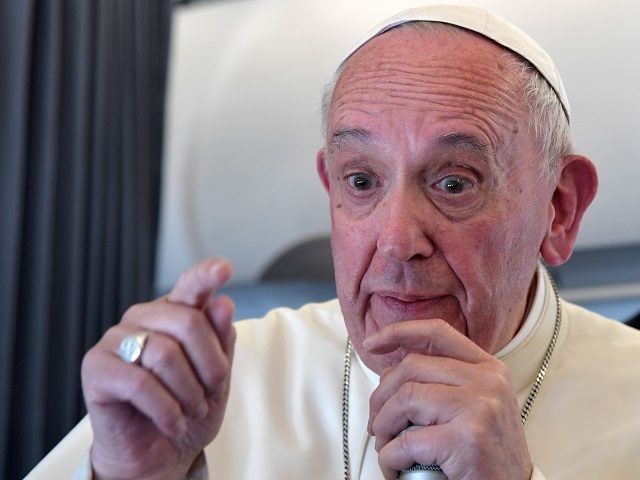Despite an NBC journalist’s best efforts to trick the Pope into saying something negative about President Trump, Francis held his ground Saturday, saying he looked forward to hearing what the president has to say at their upcoming meeting.
During the brief press conference held aboard the papal plane returning to Rome from Fatima Saturday, the pontiff fielded a number of questions. One came from NBC’s Claudio Lavanga, who pressed the Pope concerning his upcoming meeting with President Trump on May 24.
Without bothering to hide his evident dislike of the president, Lavanga set up an adversarial relationship between Trump and the Pope, telling the pontiff that while he is a bridge-builder, Trump “is threatening to build walls.”
It seems that the president also has “opinions and decisions different from you in other areas, for example regarding the need to act against global warming or concerning the acceptance of migrants,” Lavanga continued. “So, on the vigil of your meeting with him, what opinions have you formed of the policies that President Trump has adopted on these issues and what do you expect from a meeting with a head of state that appears to think and act the opposite of you?”
Carefully sidestepping the minefield planted by the journalist, Pope Francis said it would be imprudent of him to judge someone he hasn’t yet met.
“I never form a judgment of a person without first listening to him, and I believe that I shouldn’t do so,” the Pope replied. “In speaking between ourselves, things will come out: I will say what I think; he will say what he thinks. But I have never, ever wanted to form a judgment without hearing someone out.”
The Pope seemed in part to be walking back a comparable conversation from a year ago, where another journalist caught him by using a similar subterfuge.
On that occasion, while Trump was still just a candidate for the Republican nomination, Reuters journalist Phil Pullella drew a verbal caricature of Trump as a family-dividing ogre who was prepared to deport 11 million illegal immigrants. After hearing the description, the Pope famously responded that “a man who only thinks of building walls is no Christian.”
The papal spokesman subsequently had to clarify the Pope’s words, saying his comments weren’t “a personal attack or an instruction on how to vote.”
Since then, whenever a journalist has asked the Pope to comment on Trump, he has always responded by counseling prudence and giving the president a chance to prove himself.
On Trump’s inauguration day last January, Pope Francis warned against rash judgments of the new President Donald Trump.
The interviewer from the Spanish daily El País told the Pope that “the whole world is tense” over the election of President Trump, calling him a xenophobe filled with “hatred for foreigners.”
The Pope said that the new president deserved to be judged by his actions, not by “prophecies” of what he may or may not do.
“I think that we must wait and see,” Francis said. “I don’t like to get ahead of myself nor judge people prematurely. We will see how he acts, what he does, and then I will have an opinion.”
The Pope said it is “most unwise” to be afraid of something that might happen. “It would be like prophets predicting calamities or windfalls that don’t take place. We will see. We will see what he does and then evaluate,” he said. “I prefer to wait and see.”
In Saturday’s in-flight press conference, NBC’s Claudio Lavanga pressed the Pope further, repeating his question of how he would face a head of state with ideas in opposition to his (it should be mentioned that no journalist thought to ask the Pope this question regarding his meetings with Vladimir Putin, Raúl Castro, Evo Morales or Barack Obama).
Once again, the Pope deftly parried the attack, counseling bridge-building rather than throwing up a wall.
There are always doors that aren’t closed,” Francis said. “We have to look for doors that are at least ajar, to pass through and speak of things we agree on and move forward from there. Step by step.”
“Peace is a work in progress, built day by day,” he continued. “And so is friendship between people, mutual understanding and esteem: they are built up every day. Respect for the other, saying what one thinks, but with respect, walking together… Someone may see things in a certain way: that should be said, being very clear in what each one thinks.”
Not giving up, Lavanga insisted one last time. “So you think that he will soften his positions afterward?”
To which the Pope responded: “That is a political calculus that I would not allow myself to make. Even in the religious sphere, I am no proselytizer.”
Despite Lavanga’s portrayal of the two leaders as polar opposites, in point of fact, the Pope and the President have a fair amount of common ground to build on—arguably more than if Hillary Clinton had been elected.
Both leaders oppose abortion and euthanasia, defend religious liberty and conscientious objection, emphasize job creation, support the traditional family, and have spoken out strongly in defense of persecuted Christians in the Middle East and elsewhere.
Even on the question of immigration, Pope Francis asserted in January that “every country has the right to control its borders,” especially where the risk of terrorism exists. Here it is not so much a question of immigration vs. no-immigration, but legal immigration vs. illegal immigration.
In the end, the Pope is also aware that U.S. Catholics voted for Trump by a margin of 52 to 45 per cent. Both men represent something larger than themselves.
Follow Thomas D. Williams on Twitter Follow @tdwilliamsrome

COMMENTS
Please let us know if you're having issues with commenting.